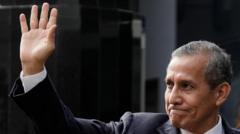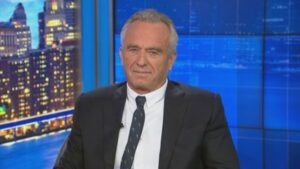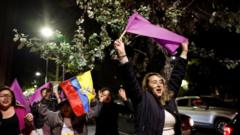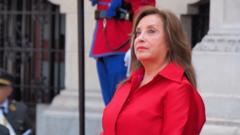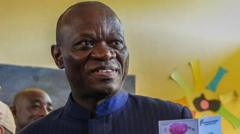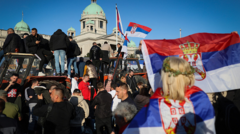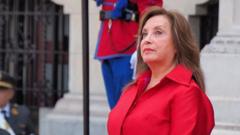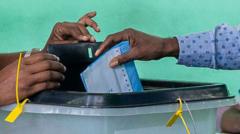The imminent presidential elections in Gabon have generated a mixture of hope and skepticism among citizens, as General Brice Oligui Nguema, the mastermind behind August's coup, runs for office shortly after ending decades of Bongo family rule.
Gabon on the Brink: A Coup Leader's Presidential Bid
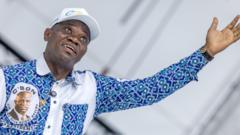
Gabon on the Brink: A Coup Leader's Presidential Bid
Tensions rise in Gabon as the coup leader prepares for a pivotal election amid public discontent and promises for change.
Gabon is holding its breath as the people approach the polls for the presidential election, keenly aware of their nation's turbulent history. General Brice Clotaire Oligui Nguema, who masterminded the recent coup, has promised significant reforms amidst a nation where youth unemployment stands at a staggering 40%. For instance, Landry Obame-Mezui, a 40-year-old cab driver in Libreville, expresses optimism thanks to Oligui Nguema's initiatives. After receiving a new taxi through a hire purchase scheme, he feels empowered as an entrepreneur. His vehicle is adorned with the motto "I will vote for the builder, Oligui Nguema," emphasizing the general's support among the youth.
The campaign trail in Libreville is dominated by Oligui Nguema's presence, as election posters and billboards flood the streets, leaving little room for the opposition's visibility. However, voter enthusiasm is low; many, like potential voter Shonnys Akoulatele, express dissatisfaction with the continuing influence of former allies of ex-president Ali Bongo among the candidates. The most notable challenger, Alain Claude Bilie-by-Nze, once held high office under both the late Omar Bongo and his son.
Oligui Nguema, a figure from the old regime, has adopted an anti-corruption platform, recently arresting the ex-president's family members on embezzlement charges. His campaign boasts of infrastructure developments while promising to root out past injustices. Still, skepticism looms, as voters like Jacques Okoumba question the authenticity of these promises, fearing that the transition may not deliver the profound change they had hoped for.
Historically significant, this election marks a departure from the Bongo-dominated politics that have characterized Gabon since 1967. Yet, political analysts urge caution, noting that many in the current government are remnants of previous administrations. Critics argue that the constitutional changes favor Oligui Nguema and limit viable opposition, potentially skewing the electoral outcome to benefit the incumbent.
As Gabon prepares for this critical moment, citizens remain hopeful yet cautious about the implications of Oligui Nguema's leadership for their future.
The campaign trail in Libreville is dominated by Oligui Nguema's presence, as election posters and billboards flood the streets, leaving little room for the opposition's visibility. However, voter enthusiasm is low; many, like potential voter Shonnys Akoulatele, express dissatisfaction with the continuing influence of former allies of ex-president Ali Bongo among the candidates. The most notable challenger, Alain Claude Bilie-by-Nze, once held high office under both the late Omar Bongo and his son.
Oligui Nguema, a figure from the old regime, has adopted an anti-corruption platform, recently arresting the ex-president's family members on embezzlement charges. His campaign boasts of infrastructure developments while promising to root out past injustices. Still, skepticism looms, as voters like Jacques Okoumba question the authenticity of these promises, fearing that the transition may not deliver the profound change they had hoped for.
Historically significant, this election marks a departure from the Bongo-dominated politics that have characterized Gabon since 1967. Yet, political analysts urge caution, noting that many in the current government are remnants of previous administrations. Critics argue that the constitutional changes favor Oligui Nguema and limit viable opposition, potentially skewing the electoral outcome to benefit the incumbent.
As Gabon prepares for this critical moment, citizens remain hopeful yet cautious about the implications of Oligui Nguema's leadership for their future.







